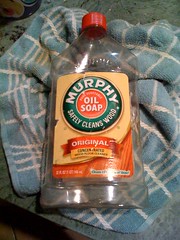Soaps of different sorts are used as insecticides, and can be very helpful for both indoor gardening, when used properly. A commercially sold soap called Neem oil soap is an oily solution which can work as both a repellent and as a fungicide. However, it can sometimes interfere with the health of delicate plants, weak plants, new transplants, and drought stressed plants. The oil draws the sun to the leaf surface and can harm blossoms. It doesn't work well with plants like the bleeding heart, gardenia, and lantana. So, be sure to test it on a small area and give it a full day to see if any wilting occurs before you apply it to larger areas.
Some people control wasps by spraying them with a dishwashing liquid solution. But dishwashing soap solutions can harm some of your plants. Any detergents that contain ingredients to dissolve grease can hurt the outer protective layers of plants that need these protective layers for survival. Insecticidal soaps are not your everyday soaps found in the kitchen, laundry room, or bathroom. You wouldn't want to wash your baby with the same shampoo you use on your dog to control fleas!
There are many different types of soaps that we use in our homes for daily use that can be used to control insects, though. Controlling and repelling are not necessarily the same as destroying. Soaps also work to kill insects by penetrating the outer covering to cause cell leakage and dehydration.
 Image by scriptingnews via FlickrIf you need to protect your personal plants with your own homemade soap solutions, just make sure you know how to mix them properly and which plants won't tolerate them well. Also, learn which soaps to use. Palmolive, Joy, Dawn, Ivory, Dove, Tide, and Murphy's Oil Soap are some that are often used for insect control.
Image by scriptingnews via FlickrIf you need to protect your personal plants with your own homemade soap solutions, just make sure you know how to mix them properly and which plants won't tolerate them well. Also, learn which soaps to use. Palmolive, Joy, Dawn, Ivory, Dove, Tide, and Murphy's Oil Soap are some that are often used for insect control.Soaps lose their effectiveness once they're dry. Homemade recipes don't always have complete instructions. You should research before making them and be leery of buying any from someone else. Automatic dishwashing detergents are not recommended. If someone has used the wrong soap, it could harm your plants. You also don't want to apply during the heat of the day or in sunlight since the use of soaps could burn your plants. You may need to condition hard water to be able to mix it with insecticidal soaps. You may have to add a de-foaming agent as well.
Soaps are generally safe for ladybugs and predaceous wasps. These are beneficial insects that help your garden and plants thrive. Not all types of the same insect are harmful to us. Predaceous wasps don't sting or bite. It's important to know which insects to keep and which to remove or destroy.

No comments:
Post a Comment